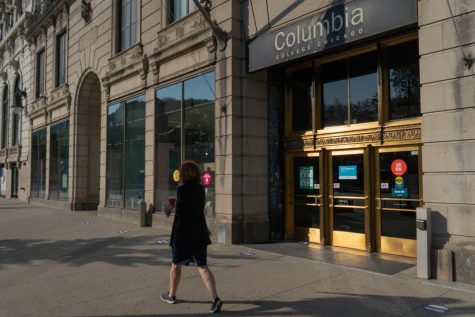College announces Social Justice Initiative to support its commitment to DEI
January 19, 2021

In its continued commitment to Diversity, Equity and Inclusion initiatives, the college announced a new Social Justice Initiative, “designed to expose and address underlying disparities within the college’s institutional framework.”
In a Monday, Jan. 18 collegewide email, Senior Vice President and Provost Marcella David said the initiative will be ongoing and provide the Columbia community with “opportunities to investigate the role of social justice in creative practice and the role of creatives in advancing social change.”
David said events like the presidential election, the Jan. 6 Capitol riot and nationwide protests demanding justice for Black lives lost to police brutality signal the importance of the college continuing its work in confronting America’s history of racism.
“At a time when our national identity is in question, as an institution of higher education, we are compelled to act,” David said. “SJI will give the college an opportunity to practice advancing social justice at the institutional level by providing a context for ongoing intellectual collegewide discussions featuring guest speakers and lecturers.”
The new initiative will include three major elements, according to the email: A Social Justice Dialogue, which will use the CCC Engage platform to initiate conversations among faculty, staff and students; Perspectives Conversations, which will “will engage campus leaders in in-depth conversations around social justice and national events”; and Creative Approaches to Social Justice, which will include “three programs to provide a unifying intellectual context for discernment” and support student work and development.
These programs will be sponsored by each school—the School of Media Arts, the School of Fine and Performing Arts and the School of Liberal Arts and Sciences—and open to everyone at the college, David said.
The programs include:
-Anti-Racist Narratives and Practices: Stories of Art and Industry: A panel discussion with industry leaders to discuss the power of anti-racist narratives and industry practices that govern those narratives.
-The Power of the Creative Voice in Advancing Social Change: A panel discussion on the impact of addressing social justice through creative disciplines and institutions’ roles in preparing students to be informed in their professions.
-Activism Now: Building opportunities for students to link their passion for change into their course assignments and extracurricular activities, specifically by bringing together individual and collaborative works through murals, videos, zines, music and other forms of expression that “reflect and explore the multifaceted nature of social justice.”
David said the initiative’s website will go live in February and another announcement will be made with updates on when the programs will be held. Joining David on the steering committee will be Steven H. Corey, dean of the School of Liberal Arts and Sciences; Eric Freedman, dean of the School of Media Arts; Rosita Sands, dean of the School of Fine and Performing Arts; Sean Wax, vice president of Development and Alumni Relations; John Pelrine, dean of students; Keisha Cowen, senior director of Campus Communications; and Rhiannon Koehler, communications manager.
She said the initiative will leverage the college’s position in the South Loop and push the conversation of social justice beyond the boundaries of Columbia. The initiative is in addition to the college’s other Diversity, Equity and Inclusion work including the recently established Antiracism Transformation Team, which is currently in the training phase.
“The college’s new Social Justice Initiative will help us understand and address long-standing gaps in achievement between white students and students of color at the college and develop and fund new support structures and resources needed to eliminate these achievement gaps over time,” David said.
More updates to come.







